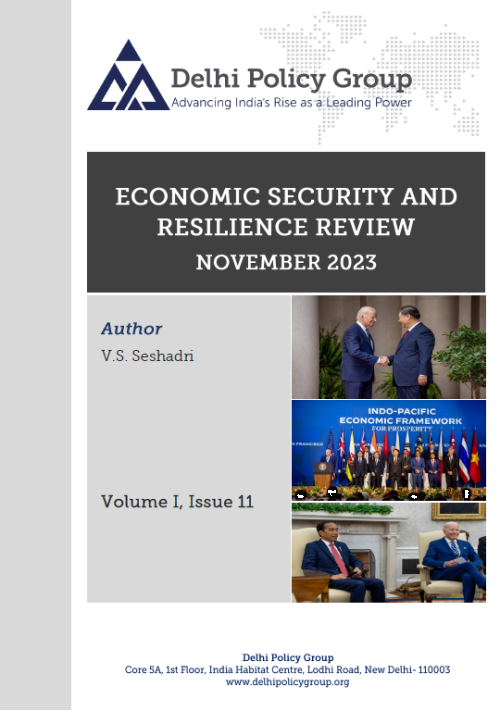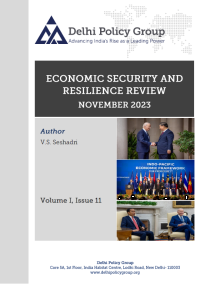Economic Security and Resilience Review
Date: December 04, 2023
The Indo-Pacific Economic Framework for Prosperity (IPEF), a unique US-led initiative designed to expand trade, investment and economic resilience in the region, made progress in several areas during the month. This edition of the ESRR begins with coverage of the third Ministerial meeting of IPEF held in San Francisco, which was marked by the signing of the supply chain pillar agreement among 14 member states. The meeting also resulted in the substantial conclusion of the clean economy and fair economy pillars of IPEF. The trade pillar of IPEF, in which India is an observer, faces an uncertain future due to differing positions among the IPEF partners, as also domestic obstacles within the US.
This month’s ESRR also reviews the outcome of the Biden-Xi summit held near San Francisco, and points out that there was no forward movement on the bridging of their differences on underlying economic issues and structural US-China competition. They also presented contrasting perspectives on global economic realities, and the way forward, in their interactions with APEC business leaders.
During the month, President Biden hosted Indonesian President Widodo at the White House, with their meeting resulting in advances in bilateral cooperation on critical minerals and semiconductors. China on its part hosted Australian PM Albanese’s visit to China, pointing to a thaw in relations. A meeting between President Xi and Japanese PM Kishida on the sidelines of the APEC meeting in San Francisco saw the two countries initiating a dialogue on export controls.
Meanwhile, EU Commission President Von der Layen delivered a speech on China on November 16, elaborating further on her remarks earlier this year in which she had argued for derisking and not decoupling. The EU also appeared to be hardening its position in pushing for a more balanced economic relationship with China. More may be known after the EU-China summit scheduled from December 7-8, 2023.
Finally, the issue also covers progress on the domestic economic security front. This includes approval of 27 proposals for hardware manufacturing under the revised PLI scheme, and the invitation of bids for mining/exploratory concessions in respect of critical minerals at 20 identified sites.
To read this ESRR, Vol. I, Issue 11, please see the PDF
This month’s ESRR also reviews the outcome of the Biden-Xi summit held near San Francisco, and points out that there was no forward movement on the bridging of their differences on underlying economic issues and structural US-China competition. They also presented contrasting perspectives on global economic realities, and the way forward, in their interactions with APEC business leaders.
During the month, President Biden hosted Indonesian President Widodo at the White House, with their meeting resulting in advances in bilateral cooperation on critical minerals and semiconductors. China on its part hosted Australian PM Albanese’s visit to China, pointing to a thaw in relations. A meeting between President Xi and Japanese PM Kishida on the sidelines of the APEC meeting in San Francisco saw the two countries initiating a dialogue on export controls.
Meanwhile, EU Commission President Von der Layen delivered a speech on China on November 16, elaborating further on her remarks earlier this year in which she had argued for derisking and not decoupling. The EU also appeared to be hardening its position in pushing for a more balanced economic relationship with China. More may be known after the EU-China summit scheduled from December 7-8, 2023.
Finally, the issue also covers progress on the domestic economic security front. This includes approval of 27 proposals for hardware manufacturing under the revised PLI scheme, and the invitation of bids for mining/exploratory concessions in respect of critical minerals at 20 identified sites.
To read this ESRR, Vol. I, Issue 11, please see the PDF



